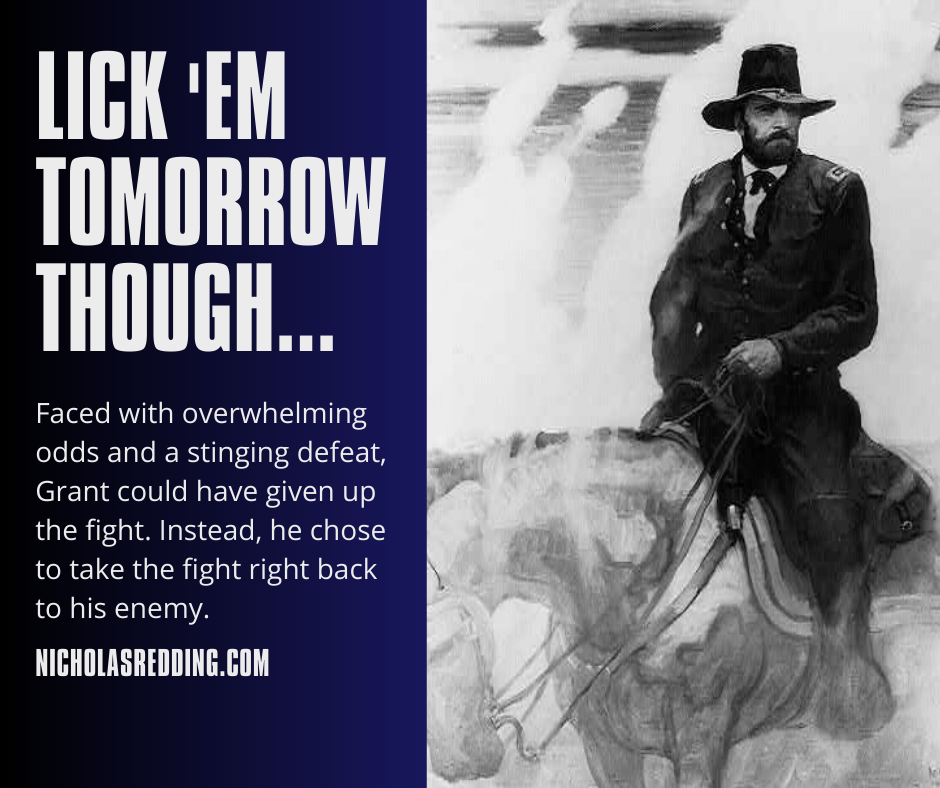Lessons from History: 'Lick 'em tomorrow, though'
After the stinging defeat on the first day at the Battle of Shiloh, U.S. General William Tecumseh Sherman approached grant late on the evening of April 6th and grumbled the now infamous line,
“Well, Grant, we’ve had the devil’s own day, haven’t we?”
In this moment, as a leader, Grant had several options — to join in and add on to Sherman’s negative review of the day’s events; to join in and go a step further by agreeing to the defeat and planning a hasty withdrawal; or, as Grant would ultimately select, to look to the future and strike a tone of optimism and determined leadership. Ultimately, Grant’s response was terse as it was filled with vigor:
“Yes,” “Lick ‘em tomorrow, though.”
As nonprofit leaders, we all are faced with these moments. In collective leadership, working closely with our teams, we are often beset by defeats, unexpected reversals, rejections and sometimes utter failures. We can lose money, staff, funders, donors — there are real risks in achieving the mission.
Perhaps the greatest risk, especially for the morale of the team, though, is to accept, embrace or wallow in the defeat. Dwight David Eisenhower, an American general from another generation, once explained that, “Optimism and pessimism are infectious and they spread more rapidly from the head downward than in any other direction.”
Grant (Second from Left on Bench) and leadership of the Army of the Potomac. Library of Congress.
As leaders, we have another job piled onto the work of running the nonprofit — and it’s baked into the title — we lead. That doesn’t just mean executing a plan or pulling together agendas. It means leading in character, discipline and tone. It means refusing to accept defeat, because pessimism is infectious. Organizations don’t succeed because of a well-written strategic plan. They succeed because of vision, mission and leadership.
Some two years after Bloody Shiloh, Grant would be faced with yet another decision. This time, in the Wilderness. It was there that Grant and the Army of the Potomac had not won the decisive victory he’d hoped. He now faced a choice — to lick his wounds and turn back — or to turn south and head straight back into the enemy.
Grant turned south.
The tangled mess of the Wilderness Battlefield, Ca. 1865. Library of Congress.
Orders from previous commanders of the U.S. Army had promised victory in flourishing words. Grant’s decision to resume the attack and pursuit offered hope in a new way. It was the physical manifestation of persistence. In this moment and his terse response at Shiloh, there are lessons in leadership for all of us struggling to make good on missions stacked high with challenges. Fortunately, for most of us, we’ll never have to take a fight to a real enemy, but we will be faced with moments when it would be far easier to accept defeat or turn back. It’s in these moments that leadership counts most — when teams see a leader refuse to accept defeat, to rise to ‘lick ‘em’ again, to keep up the good work, they can be legitimately energized and empowered.
We, too, as leaders, might find opportunities to turn into the challenge — and in doing so — give real hope and positive leadership to our teams.



